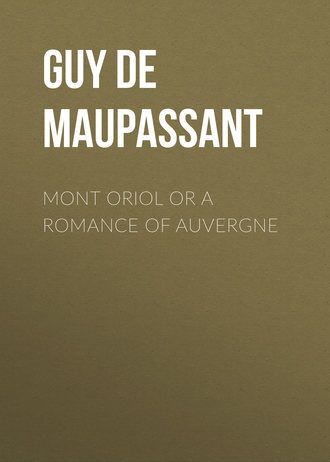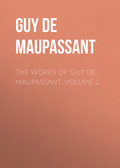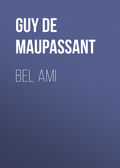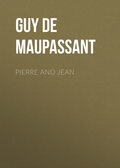
Ги де Мопассан
Mont Oriol or A Romance of Auvergne
He rubbed his hands together rapturously, and he hummed: "You shall hear my opera – my opera – my opera. You shall hear my opera."
Gontran said: "You are composing an opera?"
"Yes, I have finished it." But the commanding voice of Petrus Martel resounded:
"You understand perfectly! A yellow rocket, and off you go!"
He was giving orders for the fireworks. They joined him, and he explained his arrangements by showing with his outstretched arm, as if he were threatening a hostile fleet, stakes of white wood on the mountain above the gorge, on the opposite side of the valley.
"It is over there that they are to be shot out. I told my pyrotechnist to be at his post at half past eight. The very moment the spectacle is over, I will give the signal from here by a yellow rocket, and then he will illuminate the opening piece."
The Marquis made his appearance: "I am going to drink a glass of water," he said.
Paul and Gontran accompanied him, and again descended the hill. On reaching the establishment, they saw Père Clovis, who had got there, sustained by the two Oriols, followed by Andermatt and by the doctor, and making, every time he trailed his legs on the ground, contortions suggestive of extreme pain.
"Let us go in," said Gontran, "this will be funny."
The paralytic was placed sitting in an armchair. Then Andermatt said to him: "Here is what I propose, old cheat that you are. You are going to be cured immediately by taking two baths a day. And the moment you walk you'll have two hundred francs."
The paralytic began to groan: "My legs, they are iron, my good Monchieu!"
Andermatt made him hold his tongue, and went on: "Now, listen! You shall again have two hundred francs every year up to the time of your death – you understand – up to the time of your death, if you continue to experience the salutary effect of our waters."
The old fellow was in a state of perplexity. The continuous cure was opposed to his plan of action. He asked in a hesitating tone: "But when – when it is closed up – this box of yours – if this should take hold of me again – I can do nothing then – I – seeing that it will be shut up – your water – "
Doctor Latonne interrupted him, and, turning toward Andermatt, said: "Excellent! excellent! We'll cure him every year. This will be even better, and will show the necessity of annual treatment, the indispensability of returning hither. Excellent – this is perfectly clear!"
But the old man repeated afresh: "It will not suit this time, my good Monchieu. My legs, they're iron, iron in bars."
A new idea sprang up in the doctor's mind: "If I got him to try a course of seated walking," he said, "I might hasten the effect of the waters considerably. It is an experiment worth trying."
"Excellent idea," returned Andermatt, adding: "Now, Père Clovis, take yourself off, and don't forget our agreement."
The old fellow went away still groaning; and, when evening came on, all the directors of Mont Oriol came back to dine, for the theatrical representation was announced to take place at half past seven.
The great hall of the new Casino was the place where they were to dine. It was capable of holding a thousand persons.
At seven o'clock the visitors who had not numbered seats presented themselves. At half past seven the hall was filled, and the curtain was raised for the performance of a vaudeville in two acts, which preceded Saint Landri's operetta, interpreted by vocalists from Vichy, who had given their services for the occasion.
Christiane in the front row, between her brother and her husband, suffered a great deal from the heat. Every moment she repeated: "I feel quite exhausted! I feel quite exhausted!"
After the vaudeville, as the operetta was opening, she was becoming ill, and turning round to her husband, said: "My dear Will, I shall have to leave. I am suffocating!"
The banker was annoyed. He was desirous above everything in the world that this fête should be a success, from start to finish, without a single hitch. He replied:
"Make every effort to hold out. I beg of you to do so! Your departure would upset everything. You would have to pass through the entire hall!"
But Gontran, who was sitting along with Paul behind her, had overheard. He leaned toward his sister: "You are too warm?" said he.
"Yes, I am suffocating."
"Good. Stay! You are going to have a laugh."
There was a window near. He slipped toward it, got upon a chair, and jumped out without attracting hardly any notice. Then he entered the café, which was perfectly empty, stretched his hand out under the bar where he had seen Petrus Martel conceal the signal-rocket, and, having filched it, he ran off to hide himself under a group of trees, and then set it on fire. The swift yellow sheaf flew up toward the clouds, describing a curve, and casting across the sky a long shower of flame-drops. Almost instantaneously a terrible detonation burst forth over the neighboring mountain, and a cluster of stars sent flying sparks through the darkness of the night.
Somebody exclaimed in the hall where the spectators were gathered, and where at the moment Saint Landri's chords were quivering: "They're letting off the fireworks!"
The spectators who were nearest to the door abruptly rose to their feet to make sure about it, and went out with light steps. All the rest turned their eyes toward the windows, but saw nothing, for they were looking at the Limagne. People kept asking: "Is it true? Is it true?"
The impatient assembly got excited, hungering above everything for simple amusements. A voice from outside announced: "It is true! The firework's are let off!"
Then, in a second everyone in the hall was standing up. They rushed toward the door; they jostled against each other; they yelled at those who obstructed their egress: "Hurry on! hurry on!"
The entire audience, in a short time, had emerged into the park. Saint Landri alone, in a state of exasperation continued beating time in front of his distracted orchestra. Meanwhile, fiery suns succeeded Roman candles in the midst of detonations.
Suddenly, a formidable voice sent forth thrice this wild exclamation: "Stop, in God's name! Stop, in God's name! Stop, in God's name!"
And, as an immense Bengal fire next illuminated the mountain and lighted up in red to the right and blue to the left, the enormous rocks and trees, Petrus Martel could be seen standing on one of the vases of imitation marble that decorated the terrace of the Casino, bareheaded, with his arms in the air, gesticulating and howling.
Then, the great illumination being extinguished, nothing could be seen any longer save the real stars. But immediately another rocket shot up, and Petrus Martel, jumping on the ground, exclaimed: "What a disaster! what a disaster! My God, what a disaster!"
And he passed through the crowd with tragic gestures, with blows of his fist in the empty air, furious stampings of his feet, always repeating: "What a disaster! My God, what a disaster!"
Christiane had taken Paul's arm to get a seat in the open air, and kept looking with delight at the rockets which ascended into the sky.
Her brother came up to her suddenly, and said: "Hey, is it a success? Do you think it is funny?"
She murmured: "What, it is you?"
"Why, yes, it is I. Is it good, hey?"
She began to laugh, finding it really amusing. But Andermatt arrived in a state of great mental distress. He did not understand how such a blow could have come. The rocket had been stolen from the bar to give the signal agreed upon. Such an infamy could only have been perpetrated by some emissary of the old Company, some agent of Doctor Bonnefille!
And he repeated: "'Tis maddening, positively maddening. Here are fireworks worth two thousand three hundred francs destroyed, entirely destroyed!"
Gontran replied: "No, my dear fellow, on a proper calculation, the loss does not mount up to more than a quarter; let us put it at a third, if you like; say seven hundred and sixty-six francs. Your guests will, therefore, have enjoyed fifteen hundred and thirty-four francs' worth of rockets. This truly is not bad."
The banker's anger turned against his brother-in-law. He caught him roughly by the arm: "Gontran, I want to talk seriously to you. Since I have a hold of you, let us take a turn in the walks. Besides, I have five minutes to spare."
Then, turning toward Christiane: "I place you in charge of our friend Bretigny, my dear; but don't remain a long time out – take care of yourself. You might catch cold, you know. Be careful! be careful!"
She murmured: "Never fear, dear."
So Andermatt carried off Gontran. When they were alone, at a little distance from the crowd, the banker stopped: "My dear fellow, 'tis about your financial position that I want to talk."
"About my financial position?"
"Yes, you know it well, your financial position."
"No. But you ought to know it for me, since you lent money to me."
"Well, yes, I do know it, and 'tis for that reason I want to talk to you."
"It seems to me, to say the least of it, that the moment is ill chosen – in the midst of a display of fireworks!"
"The moment, on the contrary, is very well chosen. I am not talking to you in the midst of a display of fireworks, but before a ball."
"Before a ball? I don't understand."
"Well, you are going to understand. Here is your position: you have nothing except debts; and you'll never have anything but debts."
Gontran gravely replied: "You tell me that a little bluntly."
"Yes, because it is necessary. Listen to me! You have eaten up the share which came to you as a fortune from your mother. Let us say no more about that."
"Let us say no more about it."
"As for your father, he possesses a yearly income of thirty thousand francs, say, a capital of about eight hundred thousand francs. Your share, later on, will, therefore, be four hundred thousand francs. Now you owe me – me, personally – one hundred and ninety thousand francs. You owe money besides to usurers."
Gontran muttered in a haughty tone: "Say, to Jews."
"Be it so, to Jews, although among the number there is a churchwarden from Saint Sulpice who made use of a priest as an intermediary between himself and you – but I will not cavil about such trifles. You owe, then, to various usurers, Israelites or Catholics, nearly as much. Let us put it at a hundred and fifty thousand at the lowest estimate. This makes a total of three hundred and forty thousand francs, on which you are paying interest, always borrowing, except with regard to mine, which you do not pay."
"That's right," said Gontran.
"So then, you have nothing more left."
"Nothing, indeed – except my brother-in-law."
"Except your brother-in-law, who has had enough of lending money to you."
"What then?"
"What then, my dear fellow? The poorest peasant living in one of these huts is richer than you."
"Exactly – and next?"
"Next – next – ? If your father were to die tomorrow, you would no longer have any resource to get bread – to get bread, mind you – except to take a post as a clerk in my house. And this again would only be a means of disguising the pension which I should be allowing you."
Gontran, in a tone of irritation, said: "My dear William, these things bore me. I know them, besides, just as well as you do, and, I repeat, the moment is ill chosen to remind me about them – with – with so little diplomacy."
"Allow me, let me finish. You can only extricate yourself from it by a marriage. Now, you are a wretched match, in spite of your name, which sounds well without being illustrious. In short, it is not one of those which an heiress, even a Jewish one, buys with a fortune. Therefore, we must find you a wife acceptable and rich – which is not very easy – "
Gontran interrupted him: "Give her name at once – that is the best way."
"Be it so – one of Père Oriol's daughters, whichever you prefer. And this is why I wanted to talk to you before the ball."
"And now explain yourself at greater length," returned Gontran, coldly.
"It is very simple. You see the success I have obtained at the start with this station. Now if I had in my hands, or rather if we had in our hands all the land which this cunning peasant has kept for himself, I could turn it into gold. To speak only of the vineyards which lie between the establishment and the hotel and between the hotel and the Casino, I would pay a million francs for them to-morrow – I, Andermatt. Now, these vineyards and others all round the knoll will be the dowries of these girls. The father told me so again a short time since, not without an object, perhaps. Well, if you were willing, we could do a big stroke of business there, the two of us."
Gontran muttered, with a thoughtful air: "'Tis possible. I'll think over it."
"Do think over it, my dear boy, and don't forget that I never speak of things that are not very sure, or without having given matters every consideration, and realized all the possible consequences and all the decided advantages."
But Gontran, lifting up his arm, as if he had suddenly forgotten all that his brother-in-law had been saying to him: "Look! How beautiful that is!"
The bunch of rockets flamed up, in imitation of a burning palace on which a blazing flag had inscribed on it "Mont Oriol" in letters of fire perfectly red and, right opposite to it, above the plain, the moon, red also, seemed to have come out to contemplate this spectacle. Then, when the palace, after it had been burning for some minutes, exploded like a ship which is blown up, flinging toward the wide heavens fantastic stars which burst in their turn, the moon remained all alone, calm and round, on the horizon.
The public applauded wildly, exclaiming: "Hurrah! Bravo! bravo!"
Andermatt, all of a sudden, said: "Let us go and open the ball, my dear boy. Are you willing to dance the first quadrille face to face with me?"
"Why, certainly, my dear brother-in-law."
"Who have you thought of asking to dance with you? As for me, I have bespoken the Duchesse de Ramas."
Gontran answered in a tone of indifference: "I will ask Charlotte Oriol."
They reascended. As they passed in front of the spot where Christiane was resting with Paul Bretigny, they did not notice the pair. William murmured: "She has followed my advice. She went home to go to bed. She was quite tired out to-day." And he advanced toward the ballroom which the attendants had been getting ready during the fireworks.
But Christiane had not returned to her room, as her husband supposed. As soon as she realized that she was alone with Paul she said to him in a very low tone, while she pressed his hand:
"So then you came. I was waiting for you for the past month. Every morning I kept asking myself, 'Shall I see him to-day?' and every night I kept saying to myself, 'It will be to-morrow then.' Why have you delayed so long, my love?"
He replied with some embarrassment: "I had matters to engage my attention – business."
She leaned toward him, murmuring: "It was not right to leave me here alone with them, especially in my state."
He moved his chair a little away from her.
"Be careful! We might be seen. These rockets light up the whole country around."
She scarcely bestowed a thought on it; she said: "I love you so much!" Then, with sudden starts of joy: "Ah! how happy I feel, how happy I feel at finding that we are once more together, here! Are you thinking about it? What joy, Paul! How we are going to love one another again!"
She sighed, and her voice was so weak that it seemed a mere breath.
"I feel a foolish longing to embrace you, but it is foolish – there! – foolish. It is such a long time since I saw you!"
Then, suddenly, with the fierce energy of an impassioned woman, to whom everything should give way: "Listen! I want – you understand – I want to go with you immediately to the place where we said adieu to one another last year! You remember well, on the road from La Roche Pradière?"
He replied, stupefied: "But this is senseless! You cannot walk farther. You have been standing all day. This is senseless; I will not allow it."
She had risen to her feet, and she said: "I am determined on it! If you do not accompany me, I'll go alone!"
And pointing out to him the moon which had risen: "See here! It was an evening just like this! Do you remember how you kissed my shadow?"
He held her back: "Christiane – listen – this is ridiculous – Christiane!"
She did not reply, and walked toward the descent leading to the vineyards. He knew that calm will which nothing could divert from its purpose, the graceful obstinacy of these blue eyes, of that little forehead of a fair woman that could not be stopped; and he took her arm to sustain her on her way.
"Supposing we are seen, Christiane?"
"You did not say that to me last year. And then, everyone is at the fête. We'll be back before our absence can be noticed."
It was soon necessary to ascend by the stony path. She panted, leaning with her whole weight on him, and at every step she said:
"It is good, it is good, to suffer thus!"
He stopped, wishing to bring her back. But she would not listen to him.
"No, no. I am happy. You don't understand this, you. Listen! I feel it leaping in me – our child – your child – what happiness. Give me your hand."
She did not realize that he – this man – was one of the race of lovers who are not of the race of fathers. Since he discovered that she was pregnant, he kept away from her, and was disgusted with her, in spite of himself. He had often in bygone days said that a woman who has performed the function of reproduction is no longer worthy of love. What raised him to a high pitch of tenderness was that soaring of two hearts toward an inaccessible ideal, that entwining of two souls which are immaterial – all those artificial and unreal elements which poets have associated with this passion. In the physical woman he adored the Venus whose sacred side must always preserve the pure form of sterility. The idea of a little creature which owed its birth to him, a human larva stirring in that body defiled by it and already grown ugly, inspired him with an almost unconquerable repugnance. Maternity had made this woman a brute. She was no longer the exceptional being adored and dreamed about, but the animal that reproduces its species. And even a material disgust was mingled in him with these loathings of his mind.
How could she have felt or divined this – she whom each movement of the child she yearned for attached the more closely to her lover? This man whom she adored, whom she had every day loved a little more since the moment of their first kiss, had not only penetrated to the bottom of her heart, but had given her the proof that he had also entered into the very depths of her flesh, that he had sown his own life there, that he was going to come forth from her, again becoming quite small. Yes, she carried him there under her crossed hands, himself, her good, her dear, her tenderly beloved one, springing up again in her womb by the mystery of nature. And she loved him doubly, now that she had him in two forms – the big, and the little one as yet unknown, the one whom she saw, touched, embraced, and could hear speaking to her, and the one whom she could up to this only feel stirring under her skin. They had by this time reached the road.
"You were waiting for me over there that evening," said she. And she held her lips out to him.
He kissed them, without replying, with a cold kiss.
She murmured for the second time: "Do you remember how you embraced me on the ground. We were like this – look!"
And in the hope that he would begin it all over again she commenced running to get some distance away from him. Then she stopped, out of breath, and waited, standing in the middle of the road. But the moon, which lengthened out her profile on the ground, traced there the protuberance of her swollen figure. And Paul, beholding at his feet the shadow of her pregnancy, remained unmoved at sight of it, wounded in his poetic sense with shame, exasperated that she was not able to share his feelings or divine his thoughts, that she had not sufficient coquetry, tact, and feminine delicacy to understand all the shade which give such a different complexion to circumstances; and he said to her with impatience in his voice:
"Look here, Christiane! This child's play is ridiculous."
She came back to him moved, saddened, with outstretched arms, and, flinging herself on his breast:
"Ah! you love me less. I feel it! I am sure of it!"
He took pity on her, and, encircling her head with his arms, he imprinted two long sweet kisses on her eyes.
Then in silence they retraced their steps. He could find nothing to say to her; and, as she leaned on him, exhausted by fatigue, he quickened his pace so that he might no longer feel against his side the touch of this enlarged figure. When they were near the hotel, they separated, and she went up to her own apartment.
The orchestra at the Casino was playing dance-music; and Paul went to look at the ball. It was a waltz; and they were all waltzing – Doctor Latonne with the younger Madame Paille, Andermatt with Louise Oriol, handsome Doctor Mazelli with the Duchesse de Ramas, and Gontran with Charlotte Oriol. He was whispering in her ear in that tender fashion which denotes a courtship begun; and she was smiling behind her fan, blushing, and apparently delighted.
Paul heard a voice saying behind him: "Look here! look here at M. de Ravenel whispering gallantries to my fair patient."
He added, after a pause: "And there is a pearl, good, gay, simple, devoted, upright, you know, an excellent creature. She is worth ten of the elder sister. I have known them since their childhood – these little girls. And yet the father prefers the elder one, because she is more – more like him – more of a peasant – less upright – more thrifty – more cunning – and more – more jealous. Ah! she is a good girl, all the same. I would not like to say anything bad of her; but, in spite of myself, I compare them, you understand – and, after having compared them, I judge them – there you are!"
The waltz was coming to an end; Gontran went to join his friend, and, perceiving the doctor:
"Ah! tell me now – there appears to me to be a remarkable increase in the medical body at Enval. We have a Doctor Mazelli who waltzes to perfection and an old little Doctor Black who seems on very good terms with Heaven."
But Doctor Honorat was discreet. He did not like to sit in judgment on his professional brethren.







